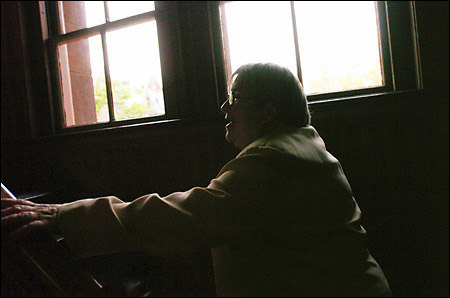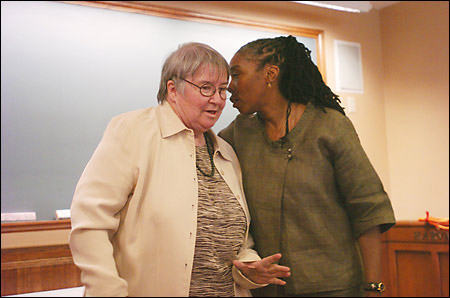At HLS, Lynne Stewart proclaims her innocence
Rahman defender faces 40 years in prison for conspiracy

Lynne Stewart says that she has simply done what any good attorney would do – provide a vigorous defense for her client. But the United States Justice Department disagrees.
Stewart’s client is Sheik Abdel Rahman, currently serving a life sentence in a United States federal prison in Minnesota for conspiring to bomb buildings, bridges, and tunnels in New York City and for inciting his followers to carry out the 1993 World Trade Center bombing and to assassinate Egyptian president Hosni Mubarak.
On April 9, 2002, FBI agents came to Stewart’s Brooklyn home and led her away in handcuffs. Agents also searched her Manhattan office and carried off files and computer records from her 30-year career as a defense attorney.
Attorney General John Ashcroft held a press conference to announce the arrest of Stewart and three Arab men as alleged co-conspirators. He also appeared on the “David Letterman Show” where he again announced the arrests and sang his musical composition “Let the Eagle Soar.”
On Feb. 10, 2005, after a seven-month trial, Stewart was convicted of conspiracy, providing material support to terrorists, and defrauding the U.S. government. She now faces up to 40 years in prison. Stewart is 65.

On Friday (May 20), she spoke about her case at Harvard Law School. She said that she was not only pleading for herself, but for the legal profession in general.
“I’m here to make a personal appeal, but more on behalf of the profession and the way we practice criminal law,” said Stewart, a former children’s librarian turned radical criminal lawyer whose clients have included drug dealers, mobsters, cop-killers, and members of the Weather Underground.
Stewart said that the crime she has been charged with consists of issuing a press release to Reuters news service in which Rahman stated, in Stewart’s paraphrase, that “a cease-fire [between the terrorist ‘Islamic Group’ and the Egyptian government] does not appear to be working.” She was also accused of distracting prison guards while an Arab translator and a paralegal (two of the other men charged in the conspiracy) helped Rahman compose messages to his Egyptian followers, opponents of Mubarak’s government.
Stewart, who said she believed Rahman to be innocent of the original conspiracy charges (“that’s the luxury of being an American – we can make up our own minds”), insisted that the press release was not an incitement to terrorism but rather a more philosophical discussion of current political issues.
“Clearly in my mind this was to be a message to the people of Egypt urging them to reconsider their tactics.”
By releasing it to the media she said she was simply providing legitimate support for her client, who is petitioning the government to transfer him to a prison facility in his native Egypt.
“A lawyer’s job is to put out information about the case, to keep the client’s name alive. Otherwise the government dominates all the public information.”
The government’s case against Stewart is based on her violation of “special administrative measures” (SAMs), which she agreed to abide by. But according to Stewart, it was only after 9/11 that the government attached serious legal consequences to the violation of SAMs.
“The government is saying that Lynne Stewart went over the line, and that therefore she’s not worthy of support or compassion. That might be true, except that they moved the line. If the government is going to make decisions for you about what is over the line and what isn’t, it can’t be after the fact, after conditions have changed.”
Stewart questioned how well defense lawyers can do their jobs if they must conscientiously obey Justice Department regulations.
“If you vigorously defend your client and follow rules set down by your adversary, how vigorous can you be?”
Another thing that has changed since 9/11 is the way the government prosecutes cases having anything to do with terrorism.
“During my case, Osama bin Laden strode into the courtroom on a huge video screen. This is now a tactic of the Justice Department, that in any case with a mention of the T-word, they will make sure the image of bin Laden is before the jury.”
Stewart also criticized the government for eavesdropping on conversations between alleged terrorists and their legal counsel, a tactic Ashcroft has defended on the grounds of national security.
“What was the government doing listening to privileged conversations between lawyers and their clients? Where will this lead?”
What her case and other recent moves by the government add up to, Steward said, is a war against the legal profession.
“This administration doesn’t like lawyers. It sees us as irritants – which I hope we are.”
Stewart’s visit was co-sponsored by Harvard Law School’s Criminal Justice Institute, the Charles Hamilton Houston Institute for Race and Justice, the Saturday School Program, and the Clinical Programs Lecture Series.




